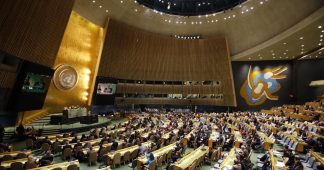Impacts of Unilateral Coercive Measures in Developing Countries: the need to end the US embargo on Cuba
August 2019
On 1 November 2018, the 193 Member States of the United Nations (UN) held the twenty-seventh consecutive annual vote of the General Assembly on a resolution entitled “Necessity of ending the economic, commercial and financial embargo imposed against Cuba.” The resolution was adopted with a near unanimous vote of 189 in favor, 2 abstentions (Ukraine and Moldova) and 2 against (United States of America and Israel). Before the vote and for the first time since the resolution was submitted in 1992, the US presented a set of eight proposed amendments to be considered by the 193 Member States, which were all rejected.
The present policy brief is a summary of the input prepared by the South Centre as a contribution to the 2019 report of the Secretary-General with respect to the imposition of unilateral economic, finance and trade measures by one State against another that is prepared pursuant to UN General Assembly Resolution 73/8.
Le 1er novembre 2018, les 193 États membres de l’Organisation des Nations Unies se sont réunis afin de voter pour la vingt-septième fois consécutive sur la résolution de l’Assemblée générale intitulée « Nécessité de lever le blocus économique, commercial et financier imposé à Cuba par les États-Unis d’Amérique ». La résolution a été adoptée à la quasi-unanimité par 189 voix pour, 2 abstentions (Ukraine et Moldova) et 2 contre (États-Unis d’Amérique et Israël). Avant le vote et pour la première fois depuis la présentation de la résolution en 1992, les États-Unis ont présenté une série de huit propositions d’amendement à examiner par les 193 États membres, qui ont toutes été rejetées.
La présente note d’orientation propose un résumé des commentaires formulés par le Centre Sud à titre de contribution au rapport présenté par le Secrétaire général en 2019 pour donner suite à la résolution 73/8 de l’Assemblée générale et portant sur l’imposition unilatérale par un État de mesures économiques, financières et commerciales à l’encontre d’un autre État.
El 1 de noviembre de 2018, los 193 Estados Miembros de las Naciones Unidas (ONU) celebraron por vigésimo séptima vez consecutiva la votación anual de la Asamblea General sobre la resolución denominada “Necesidad de poner fin al bloqueo económico, comercial y financiero impuesto contra Cuba”. La resolución fue aprobada casi por unanimidad, 189 votos a favor, 2 abstenciones (Ucrania y Moldavia) y 2 en contra (EEUU e Israel). Antes de la votación y por primera vez desde que la resolución fuera presentada en 1992, los Estados Unidos de América presentaron una serie de ocho propuestas de enmienda para que fueran consideradas por los 193 Estados Miembros, que fueron todas rechazadas.
El presente informe de política es un resumen del aporte elaborado por South Centre como contribución al informe de 2019 de la Secretaría General respecto de la imposición de medidas económicas, financieras y comerciales unilaterales de un Estado contra otro, elaborado de conformidad con la Resolución 73/8 de la Asamblea General de las Naciones Unidas.
Download the policy brief below: Impacts of Unilateral Coercive Measures in Developing Countries: the need to end the US embargo on Cuba
To access the policy brief directly, go to this webpage: https://www.
To access the South Centre website, where you can also find other policy briefs, publications and news items, go to: http://www.southcentre.int.











